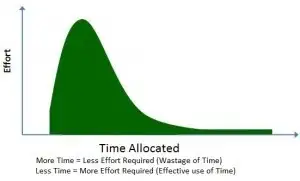
How to better deal with procrastination?
Share
1, use Parkinson's law to manage your time
The more time you are left with, the more you will tend to do the same thing slowly to complete.

That's why you are much more productive when you only have the last 5 minutes left. Because the more time you allocate to a task, the less effort you put in. So, know why you're procrastinating? Because you give yourself too much time, a good way to solve procrastination is to set a Deadline for yourself.
2, break down the huge task into small goals This method is more practical than Parkinson's Law. The reason why we procrastinate on tasks such as completing a research report or starting to write a book or learning a new language is because the task contains countless small tasks, and the countless small tasks weigh on you and give you a sense of overload, so you would rather postpone than start.
Why not start breaking it down now, rather than waiting for Parkinson's Law to kick in?
Take the example of completing a report:
Come up with 5 ideas and write them down
Come up with 5 or more ideas, write them down
Narrow those ideas down to 3
Search online for relevant information for the first idea and take notes
Search online for relevant information for the second idea and take notes
Search online and take notes for the third idea
Search for more appropriate and suitable creative ideas
Search online for relevant research results, survey reports, academic papers, etc. on this topic
Check the first article and take notes
Check the second article and take notes
Review the third article and take notes
Review all the notes you have taken
Conceptualize the general idea of the report
Create a concrete outline of the report
Start writing a paragraph
Wait It's really not a hard task if you actually follow the steps.
It's not hard for a person to come up with 5 IDEAS, and it's even less hard to gather some information and relevant academic articles. Only by breaking down a major task into smaller ones will you feel less of a mental overload and not procrastinate on a task over and over again.
Just as I learn English, I squeeze in half an hour every day to learn English, and how is this half hour allocated? There are 10 minutes to listen to VOA or BBC while riding in the car, 10 minutes to brush Quora, 10 minutes to watch TED, everyone can squeeze in half an hour, depending on whether you have the heart for it.
I've been doing this for 4 months and don't feel tired at all.

This is my motto in life: to walk like a child, one small step at a time, towards success.